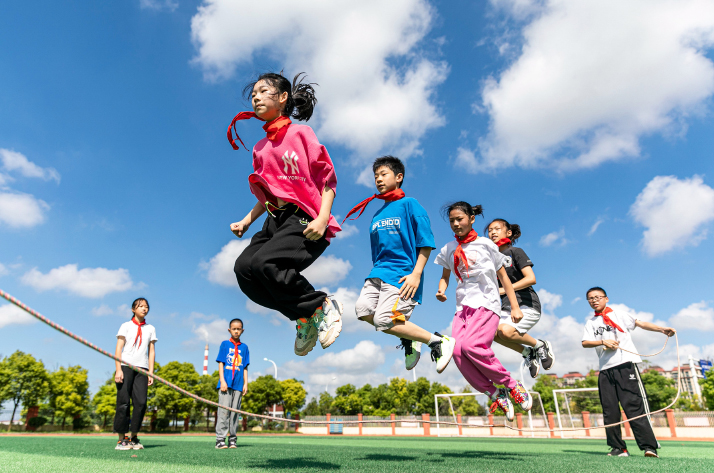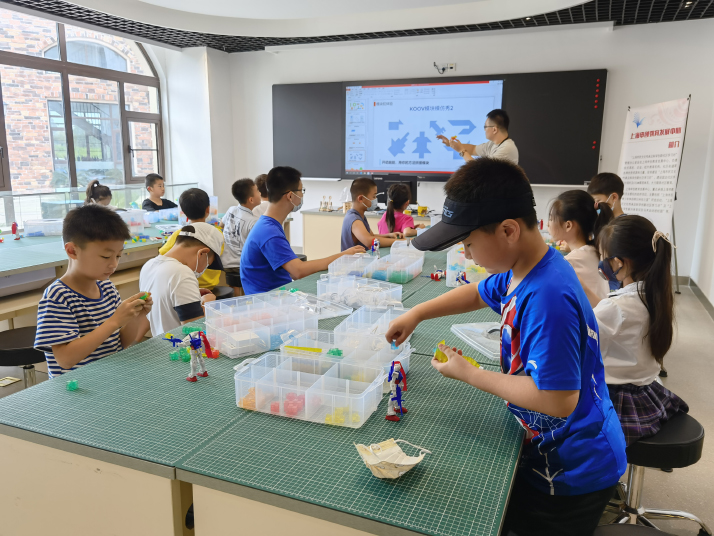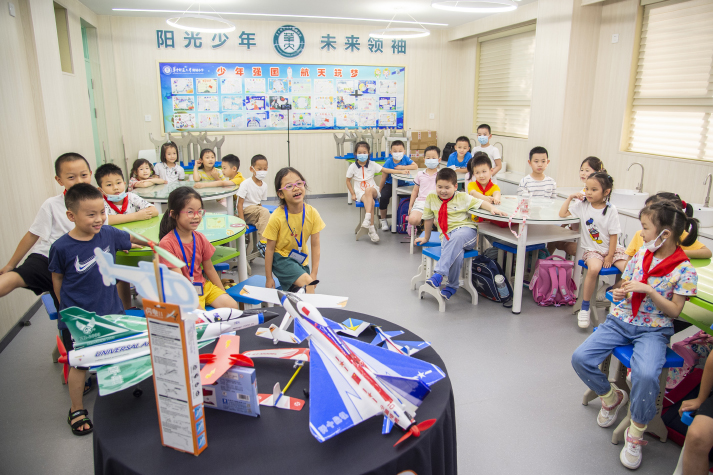| China |
| New policy relieves student burden and changes the landscape of the tutoring industry | |
|
|
 A primary school workout in Haian, Jiangsu Province, on September 3 (VCG)
As the new semester started on September 1, Liu Jing, mother of a primary school pupil in Beijing, heaved a sigh of relief since her kid can now arrive at school at 8:20 a.m. on a weekday, about half an hour later than before. "Although it's only half an hour later, it allows us to have breakfast and get ready for school in a more leisurely manner," Liu told Beijing Review. The change comes courtesy of a new guideline issued by the central authorities in late July to further reduce the excessive burden from homework and after-school tutoring for primary and middle school students within three years, also known as the "double reduction" policy. In spite of previous government efforts to reduce academic pressure on students, the burden remains heavy. On the one hand, students still have to do a lot of homework; on the other hand, they have to take courses offered by after-school training institutions, whose content is often far more advanced than that in the school curriculum. Furthermore, many of the tutoring companies charge unreasonably high fees and parents have had a hard time getting refunds—if any—following the closing down of some off-campus schools. Cases of institutions running off with the parents' hard-earned money occur from time to time. All these problems have offset the country's previous education reform efforts and caused public discontent. Reining in a wild industry One important aspect of the policy is the regulation of after-school training institutions. It bans local authorities from approving any new tutoring institutions for academic course training. All existing curriculum-based tutoring institutions are required to register as non-profit organizations and are prohibited from going public. What's more, listed companies are barred from investing in such institutions. They are not allowed to teach subjects or content too much ahead of the school curriculum and cannot offer training on weekends, national holidays or in winter and summer vacations. The new policy is currently in its pilot stage across nine cities, including Beijing, Shanghai and Guangzhou, before being rolled out nationwide in the future. According to statistics from the Ministry of Education (MOE), there were 400,000 after-school training institutions in China in 2018, almost twice the number of schools for compulsory education at that time. Without regulation, these institutions might develop into another system running parallel to the national education system. Hungry for profit, they advertise excessively to push up demand, which fuels anxiety among parents and runs counter to the nature of education, which is to serve the public interest. "The heavy burden of parenting has become one of the reasons for young people not to have kids at all and for couples with one kid to be reluctant to have a second one," Zhou Haiwang, Deputy Director of the Institute of Population and Development at the Shanghai Academy of Social Sciences, said. In metropolises such as Beijing and Shanghai, the fee for one class is around 200 yuan ($30.9) on average and some families would spend as much as 100,000 yuan ($15,470) per year on after-school tutoring. Educational costs can take up more than half of a family's total income. According to a report by the Chinese Society of Education, around 70 percent of primary and middle school students in large cities were taking part in after-school tutoring. The thriving market powered the growth of a number of training giants such as New Oriental Education and Technology Group and TAL Education Group. Financial statements show the net revenue of the New York Stock Exchange-listed TAL Education Group reached $1.3 billion in the fourth quarter of the latest fiscal year, up 58.9 percent year on year. In December 2019, stock value of New Oriental exceeded $20 billion. However, after the introduction of the double reduction policy, share prices of education giants such as New Oriental plummeted nearly 90 percent. Xiong Bingqi, head of 21st Century Education Research Institute, said the new policy will have a big impact on training institutions. "They should choose to either exit the stock market or shed their listed assets of all curriculum-based training," he said. In response to the new regulations, many tutoring institutions are already changing course and transforming themselves. For instance, in July, TAL Education Group launched its new service brand called Qingzhou, which focuses on tutoring for postgraduate examinations and qualification exams for studying abroad, including TOEFL and IELTS. New Oriental has started to offer courses in fine arts and calligraphy. Gu Mingyuan, an education expert and senior professor at Beijing Normal University (BNU), told Economic Daily that after-school training companies should serve as a supplement to school education and provide services for students to develop hobbies in the fields of sports, music, dance, art and science and technology to enrich their lives. Chu Zhaohui, a researcher with the National Institute of Education Sciences, told China Youth Daily that it remains to be seen to what extent the new policy will impact the institutions. "The primary reason for their runaway growth has been that exam scores to this day remain the sole criterion for evaluating students and there are imbalances in the education quality between different schools," Chu said. "If the evaluation system based on scores persists, it will become very challenging to curb the growth of after-school training," he added.  Students learn how to put together their own robots at a youth center in Shanghai on September 5 (XINHUA)
Relieving the pressure To reduce the homework load, the new policy requires schools to reduce the amount and the complexity of homework and provide extracurricular services. The guideline stipulates that primary schools are prohibited from assigning homework to students in grades one and two, while homework for pupils in grades three to six should be able to get done within one hour. For a long time, many primary schools wrapped up classes at 3:30 p.m. every day, long before any parent gets off work. The arrangement made it hard for working parents to pick up their kids. Some parents sent their children to training institutions, resulting in the phenomenon of "burden from school reduced and that from tutoring institutions increased." The new policy aims to solve this conundrum. Schools must now improve their after-class services to satisfy the diversified student demand. These services should also not conclude earlier than the time when most parents get off work. Schools should offer activities in science popularization, art, reading and sports and not teach any new class during the period. According to the MOE, the new policy aims to improve the quality of school education to enable students to learn enough at school so as to reduce the demand for after-school training. As extracurricular activities will prolong teachers' working hours, efforts should be made to ensure their rights and interests, too. Xue Eryong, an education policy professor at BNU, said local finance can increase funding for schools to ensure teachers' incomes. Retired teachers, students from normal universities and community workers, too, can be called upon to provide the services or schools can purchase services from training institutions directly to alleviate the teachers' workloads.  Students take part in an extracurricular science program at a primary school in Wuhan, capital of Hubei Province, on September 2 (XINHUA)
Lingering challenges However, many challenges remain. Wang Feng, a middle school student in Beijing, said, "I can hardly understand what the physics teacher teaches at school. The teacher doesn't care whether I can understand it or not because there are so many students in our class. However, in the after-school class, the teacher helps me correct my mistakes." "If the education quality of schools cannot improve, the demand for after-school training will persist and such institutions will have the possibility to resuscitate their previous business," Chu said. At the press conference on August 31, Li Yi, spokesperson of the Beijing Municipal Education Commission, said that primary and middle school teachers from public schools in Beijing will be required to take part in rotation programs to further improve education equity and quality. Teachers who have worked in the same school for more than six years and who are more than five years away from retirement should participate in the program. Li Baoping, a veteran English teacher from Huiwen Middle School in Dongcheng District of Beijing, was assigned to provide guidance for English teaching at one of the school's branches last year. She invited English teachers to come join her class and shared teaching methods. After one year, the school's English teaching had improved significantly. However, experts say it's hard to normalize and institutionalize the rotation system given the fact that there are large quality gaps between schools. "As long as there are differences in quality, there will be obstacles for the rotation of teachers," Chu said. Whether parents can really relax after the implementation of the policy is also doubtful. In the face of cutthroat competition for admission into top senior middle schools and universities, some parents still worry that their children will be left behind without tutoring, and are seeking private coaching for their children. Fu Weidong, a professor at Central China Normal University, said the new policy cannot entirely dispel parental anxiety because the underlying reasons are rather complicated, including the prerequisite for academic degrees on the job market and parents' overly high expectations of their children. Similarly, as the middle- and high-income groups expand, they would like their children to have access to premium educational resources to maintain their status. However, the unbalanced and inadequate educational resources in reality cannot meet this request. "The new policy has only reduced that anxiety fueled by tutoring institutions," Fu said. As life is about more than academics, Xiong suggested parents should change their parenting style to pay more attention to educating their children on morals and life at large, instead of focusing on scores. (Print Edition Title: Reshaping Education) Copyedited by Elsbeth van Paridon Comments to jijing@bjreview.com |
|
||||||||||||||||||||||||||||||
|
